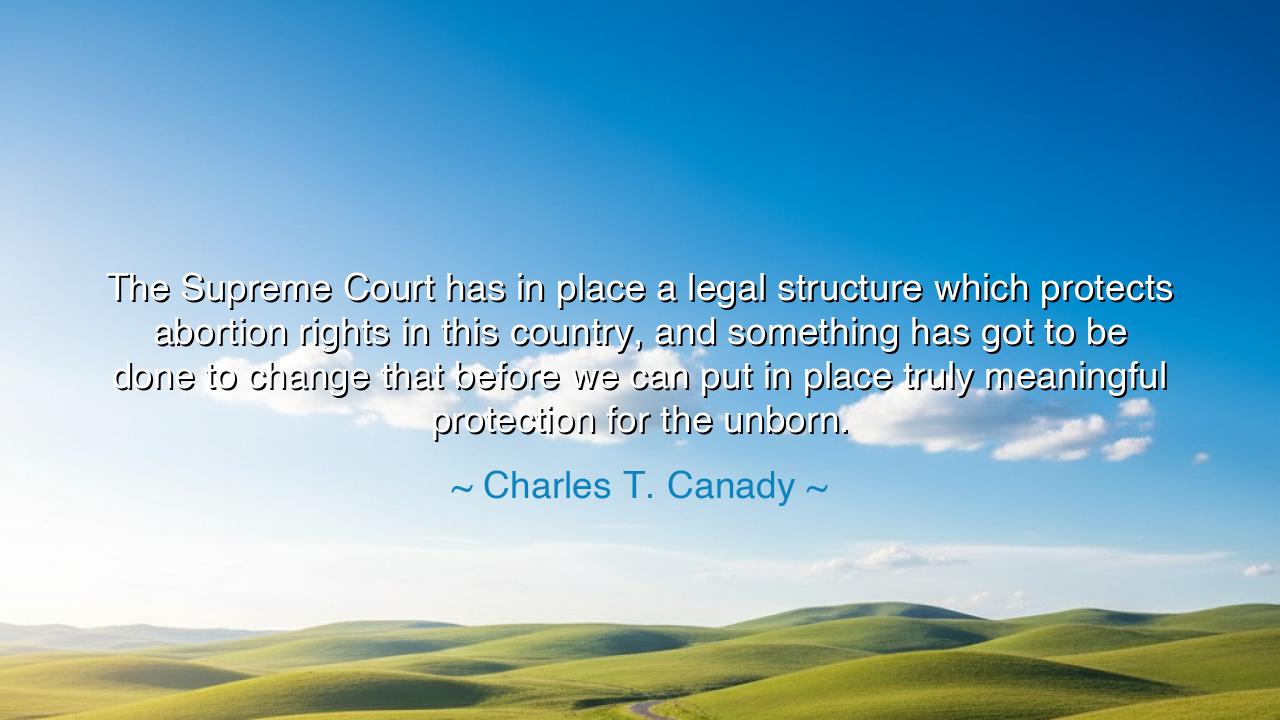
The Supreme Court has in place a legal structure which protects
The Supreme Court has in place a legal structure which protects abortion rights in this country, and something has got to be done to change that before we can put in place truly meaningful protection for the unborn.






The words of Charles T. Canady, “The Supreme Court has in place a legal structure which protects abortion rights in this country, and something has got to be done to change that before we can put in place truly meaningful protection for the unborn,” echo like a trumpet call from the heart of a long moral and judicial struggle. They are not the words of anger, but of conviction — the voice of a man who believes that the balance of law and life has fallen out of harmony, and that justice must be recalibrated to honor those who cannot yet speak. In these words, Canady stands in the ancient lineage of those who have wrestled with the deepest questions of morality and governance: When does life begin? What does it mean to protect the weak? And how does a nation reconcile its laws with its conscience?
The origin of this quote lies in the turbulent history of American abortion law, a saga that began in earnest with the Supreme Court’s decision in Roe v. Wade (1973). That ruling, built upon the right to privacy, established a legal structure that protected a woman’s right to choose abortion within certain limits. To those like Canady — a jurist and legislator shaped by faith and the philosophy of natural rights — this framework seemed to invert the moral order, protecting choice where, he believed, the duty to preserve life should reign supreme. His statement reflects not only a legal argument, but a moral worldview: that civilization itself is measured by how it guards its most vulnerable, and that the unborn, though silent, are part of that sacred circle of protection.
Throughout history, every society has faced its own reckoning with such questions. The ancients spoke of justice as the highest virtue of the state — the balance that holds the cosmos together. Plato taught that injustice arises when the powerful forget their duty to the powerless. And so, in Canady’s plea, there is an echo of that eternal principle: that laws which fail to defend the defenseless are incomplete, and that moral order demands constant renewal. His call for change is not merely political, but philosophical — it is a challenge to the very soul of the nation, asking whether comfort and freedom have blinded it to its responsibility to life itself.
To understand his meaning more deeply, one might recall the tale of William Wilberforce, the British statesman who devoted his life to ending the slave trade. For decades, Wilberforce stood against the prevailing laws and customs of his time, arguing that no civilization that sanctioned human bondage could truly call itself moral. The law, he knew, does not always mirror righteousness — it must be shaped, reformed, and sometimes defied to align with truth. So too, Canady’s words arise from the same conviction: that the law’s purpose is not to reflect the whims of the age, but to protect the sanctity of life in all its forms, even when that protection challenges the culture of the moment.
Yet, Canady’s statement also reveals the tension between law and morality that every society must navigate. The Supreme Court, in his view, had erected barriers to reform — a fortress of precedent and interpretation that insulated abortion rights from the reach of legislative will. He does not call for violence or defiance, but for change through lawful means — through the patient reshaping of legal foundations. This is the ancient way of reformers who understand that righteousness must work within the order it seeks to transform. The struggle for moral law is not the work of a day, but of generations — requiring both courage and restraint, both fire and wisdom.
But beyond the politics and philosophy lies something more deeply human. Canady’s words flow from a heart that grieves for what is unseen — for the lives that, in his eyes, are lost before they begin. Whether one agrees or disagrees with his position, one cannot miss the earnestness of his concern. It is the voice of a man who looks upon his nation and asks: What kind of people do we wish to be? In this, he joins the chorus of moral thinkers through the ages who have reminded humanity that freedom, without virtue, becomes emptiness — and that compassion must extend to those who cannot plead their own cause.
Let the lesson of this quote, then, be twofold. First, that law is not static — it must always be measured against the evolving conscience of mankind. And second, that those who seek to reform it must do so not with hatred, but with humility. Whether one stands for the rights of the unborn or for the autonomy of the individual, the path to righteousness is the same: to act from love, not pride; to argue with reason, not rage; to remember that every human being, born or unborn, advocate or adversary, shares in the divine spark that gives life its worth.
Thus, when Charles T. Canady calls for “meaningful protection for the unborn,” his words reach beyond the courtroom and into the eternal dialogue between justice and mercy. They remind us that civilization’s greatness lies not in its wealth or power, but in its reverence for life — in its willingness to protect the fragile, to uphold the sacred, and to ensure that the law serves not only the living, but the very principle of life itself.






AAdministratorAdministrator
Welcome, honored guests. Please leave a comment, we will respond soon